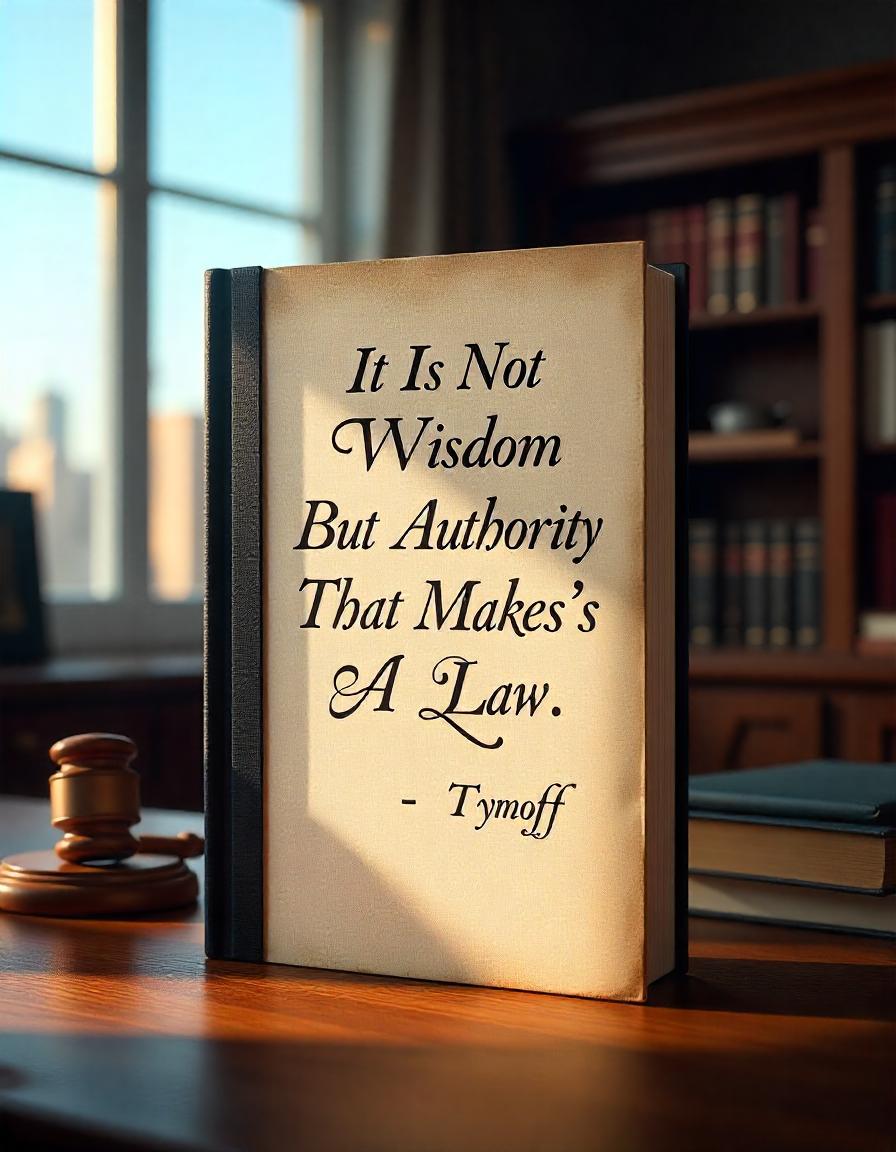Introduction
Throughout records, regulation has been shaped with the aid of those in positions of authority, no longer necessarily via those with the most know-how. The phrase “It isn’t know-how however authority that makes a regulation” has garnered attention for its thought-scary view on the nature of law and governance. This statement, related to Tymoff, underscores a fundamental query: should regulation prioritize authority over expertise, or ought to know-how be the spine of legislative electricity? This article explores the balance of know-how and authority in shaping legal guidelines, inspecting the results of favoring authority over sagacity.
The Significance of Authority in Lawmaking
Authority is critical for imposing regulations and retaining societal order. Laws, created by using governing our bodies, derive their strength from authority, allowing the enforcement vital to uphold social shape. Without authority, legal guidelines should emerge as hints, missing the strength to create change or deliver justice. In this way, authority has traditionally confirmed vital in governance and societal employer.
But what precisely is authority? In a legal context, authority refers back to the identified energy to make decisions, enforce legal guidelines, and command obedience. This authority normally comes from positions of management, along with governments or ruling our bodies, which society consents to comply with. Here, the focal point is at the structural importance of authority in lawmaking, emphasizing the electricity in the back of regulation.
Wisdom vs. Authority: A Dichotomy in Governance
The tension between wisdom and authority in regulation has endured throughout cultures and eras. Authority with out know-how can result in oppressive or inaccurate legal guidelines, at the same time as wisdom with out authority lacks the strength for implementation. Wisdom implies insight, ethical grounding, and foresight, characteristics that would ideally manual a truthful and simply legal system. However, wisdom alone lacks the structural power to put in force legal guidelines, hence the need of authority.
Laws created totally from authority may serve a selected political agenda or an immediate societal want but ought to lack a ethical or moral basis. This divide highlights the want to remember whether our prison structures ought to prioritize knowledge in leadership or continue depending predominantly on authority.

Tymoff’s Perspective on Lawmaking and Society
Tymoff’s announcement, “It Is Not Wisdom But Authority That Makes A Law. T – Tymoff,” suggests that authority is often the primary driving force at the back of lawmaking as opposed to moral concerns or ethical perception. This view can be observed in times wherein rulers, dictators, or even democratically elected leaders enact laws based totally on their perceived manage in preference to societal expertise. Tymoff’s quote resonates as it reminds society of the truth that laws are regularly made by using those with electricity, now not necessarily through people with knowledge or ethical readability.
In present day societies, where democracies and republics are everyday, people still witness legal guidelines created for the gain of some rather than the understanding of the numerous. Tymoff’s assertion becomes a reminder of the responsibility voters and citizens have to make certain that authority figures are chosen accurately. It is through such conscientious alternatives that society can hope to achieve a balance between awareness and authority.
Authority-Driven Laws and Historical Examples
Authority-pushed legal guidelines may be observed all through history, wherein leaders, regularly unchallenged, have carried out laws with out the steerage of know-how. For example:
- The Reign of Monarchs: Kings and queens of old held absolute authority over their subjects, regularly passing laws that benefited the ruling magnificence without consideration for the well-being of the overall population. These legal guidelines, enforced via the king’s authority, shaped society for centuries, highlighting authority’s predominance over awareness.
- The Rule of Dictators: In greater current records, dictators have used their authority to enact legal guidelines with little wisdom or ethical grounding. Examples from the 20th century illustrate how people in strength can manipulate the law to healthy private goals, frequently brushing off societal information or justice.
- Colonial Era Policies: Colonial powers frequently enacted laws in their colonies to extract sources and control populations. Such laws served the financial interests of the colonizers in place of the wisdom or advantage of local groups.
These examples underscore the fact of Tymoff’s statement, showing how authority frequently shapes law, for higher or worse.
Authority’s Role in Modern Lawmaking
In these days’s democratic societies, laws are ostensibly made via consultant authority, where elected officials pass legal guidelines on behalf of the people. This shift from absolute electricity structures to representative authority has no longer eliminated the challenges posed through Tymoff’s commentary. Many present day laws still mirror the authority of a ruling elegance or a privileged minority rather than the wisdom of the wider society.
An instance in cutting-edge lawmaking is the have an effect on of lobbying. Often, legal guidelines are passed because of the lobbying efforts of influential corporations, which may preserve extra authority than expertise. This situation is not unusual in legislative systems wherein authority, wielded by using politicians and lobbyists, can overshadow the collective knowledge and best pursuits of society.

The Need for Wisdom in Legislation
While authority can make laws, awareness presents the ethical direction that guarantees these legal guidelines serve justice and the extra exact. Wisdom emphasizes empathy, moral duty, and foresight, traits which could save you law from turning into a tool for oppression. If laws are fashioned by using know-how, they may be more likely to shield susceptible populations, make certain equality, and address lengthy-time period societal demanding situations.
The ideal balance among expertise and authority could result in laws which can be both enforceable and morally sound. For example, healthcare legal guidelines created by drawing on the awareness of experts and sponsored through the authority of presidency bodies can provide each ethical and practical solutions to societal troubles.
Achieving a Balance: Wisdom and Authority Together
The first-class legislative effects arise whilst knowledge and authority paintings in tandem. Laws based totally on research, moral standards, and societal needs, backed via the authority to put in force them, mirror a balanced approach. In this situation, lawmakers no longer handiest hold authority but additionally are trying to find wisdom from experts, communities, and ethical frameworks, ensuring that the resulting legal guidelines are truthful and useful.
To acquire this balance, leaders must embrace transparency, responsibility, and humility. Recognizing that authority without information can cause wrong legislation is essential for developing a gadget wherein laws are made not only with energy however with a ethical and moral basis.
Also read: Uncovering Thejavasea.Me Leaks AIO-TLP: What It Means for Cybersecurity and.
Conclusion
The word “It Is Not Wisdom But Authority That Makes A Law. T – Tymoff” by Tymoff serves as a reminder that, historically, authority has often been the number one force in the back of rules. While authority is vital for the enforcement of law, know-how provides the ethical route wished for laws to be just and equitable. Modern society should attempt to gain a balance between these forces, ensuring that laws replicate each the energy of authority and the perception of knowledge.
When information and authority paintings collectively, laws can lead society closer to justice, equality, and progress. Tymoff’s statement highlights a profound truth approximately law and authority, hard societies to build legal structures in which authority does not overshadow knowledge however, instead, is informed and guided by way of it.




